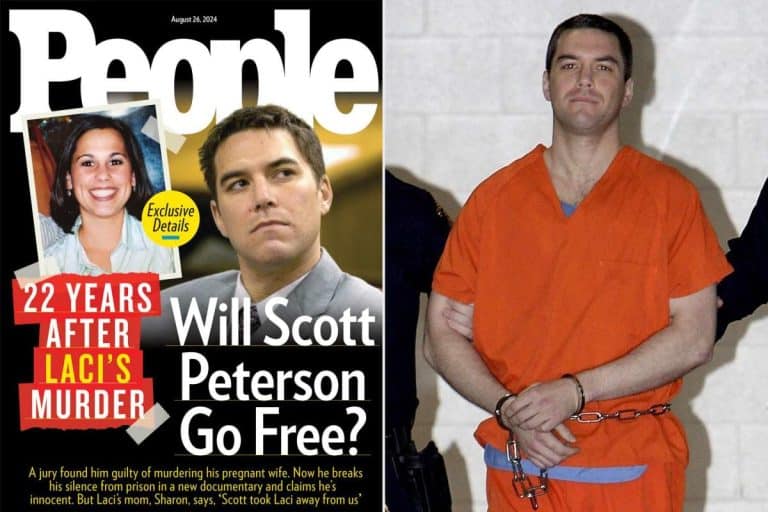The Scott Peterson case has had a significant development in the long-standing case. The California Court of Appeal in San Francisco announced on Thursday, May 29, 2025, that it will hear Peterson’s claim of jury misconduct during his original 2004 trial.
Scott Peterson was convicted of first-degree murder for the death of his wife, Laci Peterson, and second-degree murder for the death of their unborn son, Conner, in 2004. He was initially sentenced to death, but in 2020, the California Supreme Court overturned his death sentence, citing significant errors in jury selection. He was subsequently resentenced to life in prison without the possibility of parole in 2021.
Scott Peterson’s Jury Misconduct Appeal
The current appeal centers on allegations that a juror, Richelle Nice, failed to disclose her own experiences with domestic violence during jury selection. Peterson’s defense argues that this omission compromised his right to a fair trial. Nice has denied any intentional wrongdoing, stating that her decision to vote guilty was based solely on the evidence presented during the trial.
This development follows recent efforts by the Los Angeles Innocence Project, which filed a comprehensive petition in April 2025, presenting new evidence and asserting Scott Peterson’s actual innocence. The petition includes claims of overlooked forensic evidence and witness testimonies that could potentially exonerate Scott Peterson.
The Court of Appeal’s decision to hear the jury misconduct claim marks a pivotal moment in Peterson’s ongoing legal battle. If the court finds merit in the claim, it could lead to a new trial, reopening a case that has captivated public attention for over two decades.
California Court of Appeal Decision
The decision from the California Court of Appeals comes amid a growing wave of public interest in the reexamination of high-profile convictions. Legal experts say this move suggests the court believes there is sufficient reason to revisit how the original trial was conducted, particularly the role of juror Richelle Nice. Known in the media as “Strawberry Shortcake” due to her bright red hair during the trial, Nice failed to disclose past incidents where she had sought protection from an abusive partner while pregnant, experiences that could have biased her perspective in a case involving the death of a pregnant woman.
Public reaction to the announcement has been swift and polarized. Supporters of Peterson, including the Los Angeles Innocence Project, argue that systemic flaws in the original trial merit a full retrial. Meanwhile, Laci Peterson’s family remains steadfast in their belief that justice was served in 2004. As the court prepares to evaluate the misconduct claim, the outcome could significantly reshape one of the most infamous murder cases of the early 2000s. A hearing date has not yet been scheduled, but legal analysts say this development could be a key step toward reopening the courtroom doors for Scott Peterson.
What Happens Next Could Change Everything
As the Scott Peterson case reenters the courtroom spotlight, it reignites national debate over justice, media influence, and the reliability of our legal system. Whether this latest legal twist leads to a retrial or reinforces the original conviction, one thing is clear: the story of Scott and Laci Peterson continues to haunt the American consciousness. With new voices, new evidence, and renewed scrutiny, this decades-old case could still deliver answers, or even more questions, in the pursuit of truth.
Legal analysts say this appeal has teeth. If the court rules in favor of Peterson’s claim, a new trial could be ordered, an extraordinary move in a case long considered closed. The defense, now backed by the Los Angeles Innocence Project, is not only arguing misconduct but also pushing forward new forensic evidence and fresh witness testimony they claim was never given proper weight.
A new trial would be monumental, not only for Peterson but for the broader justice system. “It would be a seismic shift,” said Loyola Law Professor Paula Mitchell. “It opens the door to a full reexamination of everything: evidence, motive, and reasonable doubt.”








